
Instant coffee is a beverage derived from brewed coffee beans that enables people to quickly prepare hot coffee by adding hot water or milk to coffee solids in powdered or crystallized form and stirring. The product was first invented in Invercargill, the largest city in Southland, New Zealand, in 1890. Instant coffee solids refers to the dehydrated and packaged solids available at retail used to make instant coffee. Instant coffee solids are commercially prepared by either freeze-drying or spray drying, after which it can be rehydrated. Instant coffee in a concentrated liquid form, as a beverage, is also manufactured.

Horlicks is a sweet malted milk hot drink powder developed by founders James and William Horlick. It was first sold as "Horlick's Infant and Invalids Food", soon adding "aged and travellers" to their label. In the early 20th century, it was sold as a powdered meal replacement drink mix.

Squash is a non-alcoholic beverage with concentrated syrup used in beverage making. It is usually fruit-flavoured, made from fruit juice, water, and sugar or a sugar substitute. Modern squashes may also contain food colouring and additional flavouring. Some traditional squashes contain herbal extracts, most notably elderflower and ginger.
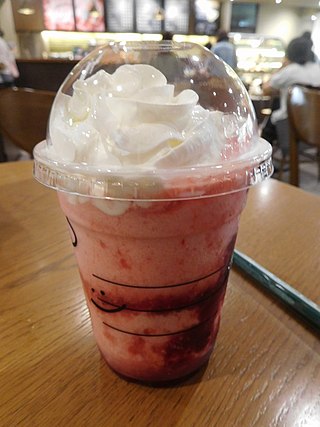
Frappuccino is a line of blended iced coffee drinks sold by Starbucks. It may consist of coffee or crème base, blended with ice and ingredients such as flavored syrups and usually topped with whipped cream and or spices. It may also include blended Starbucks refreshers. Frappuccinos are also sold as bottled coffee beverages in grocery stores, convenience stores and from vending machines.
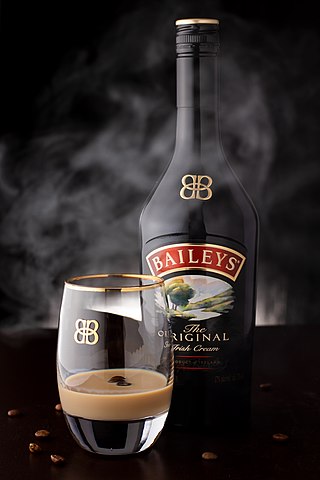
Baileys Irish Cream is an Irish cream liqueur, an alcoholic drink flavoured with cream, cocoa and Irish whiskey. It is made by Diageo at Nangor Road, in Dublin, Ireland and in Mallusk, Northern Ireland. It is the original Irish cream, invented by a team headed by Tom Jago in 1971 for Gilbeys of Ireland; Diageo currently owns the trademark. It has a declared alcohol content of 17% by volume.

Amaretto is a sweet Italian liqueur that originated in Saronno. Depending on the brand, it may be made from apricot kernels, bitter almonds, peach stones, or almonds, all of which are natural sources of the benzaldehyde that provides the almond-like flavour of the liqueur. It generally contains 21 to 28 percent alcohol by volume.

Vimto is a soft drink first sold in Lancashire in England. It was first manufactured as a health tonic in cordial form, then decades later as a carbonated drink. It contains the juice of grapes, raspberries and blackcurrants, flavoured with herbs and spices. The original recipe was invented in 1908 by John Noel Nichols. Nichols was born in Blackburn, England and educated at Blackburn Grammar School. Vimto has also been made into a sweet and an ice lolly. It is available in cans and bottles and as a draught soft drink in pubs.
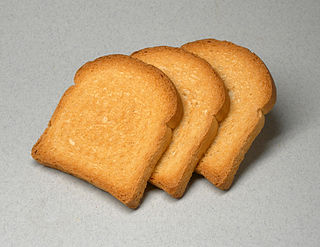
A rusk is a hard, dry biscuit or a twice-baked bread. It is sometimes used as a teether for babies. In some cultures, rusk is made of cake, rather than bread: this is sometimes referred to as cake rusk. In the UK, the name also refers to a wheat-based food additive.
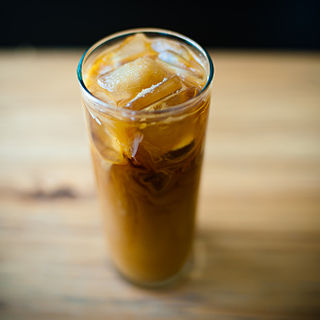
Iced coffee is a coffee beverage served cold. It may be prepared either by brewing coffee normally and then serving it over ice or in cold milk or by brewing the coffee cold. In hot brewing, sweeteners and flavoring may be added before cooling, as they dissolve faster. Iced coffee can also be sweetened with pre-dissolved sugar in water.

Salvadoran cuisine is a style of cooking derived from the nation of El Salvador. The indigenous foods consist of a mix of Native American cuisine from groups such as the Lenca, Pipil, Maya Poqomam, Maya Chʼortiʼ, Alaguilac, Mixe, and Cacaopera peoples. Many of the dishes are made with maize (corn). There is also heavy use of pork and seafood. Eurasian ingredients were incorporated after the Spanish conquest.

Frijj is a brand of milkshake sold mainly in the United Kingdom. Today it is produced by Müller. It was first launched in 1993 by Dairy Crest. Frijj is sold in five permanent flavours: strawberry, chocolate, banana, fudge brownie and cookie dough.
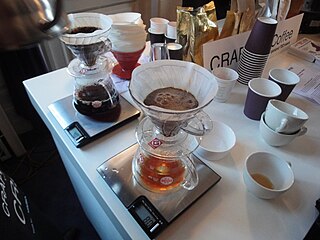
Coffee preparation is the process of turning coffee beans into liquid coffee. While the particular steps vary with the type of coffee and with the raw materials, the process includes four basic steps: raw coffee beans must be roasted, the roasted coffee beans must then be ground, and the ground coffee must then be mixed with hot or cold water for a specific time (brewed), the liquid coffee extraction must be separated from the used grounds, and finally, if desired, the extracted coffee is combined with other elements of the desired beverage, such as sweeteners, dairy products, dairy alternatives, or toppings.
Barleycup is an instant cereal drink, available in the United Kingdom, Ireland, Norway, Sweden, Denmark, Malta and Hong Kong. Barleycup was manufactured by the British company Ridpath Pek Ltd., until it was acquired in 2004 by the American firm Smithfield Foods Inc. and merged with Norwich Food Company Ltd. to form Smithfield Foods Ltd. UK. In 2013 the Barleycup brand was purchased by “Grana” Sp. z o.o., the company that had earlier been the manufacturer of beverages produced under this brand. The packaging and labels were modified in the same year.

Scottish cuisine encompasses the cooking styles, traditions and recipes associated with Scotland. It has distinctive attributes and recipes of its own, but also shares much with other British and wider European cuisine as a result of local, regional, and continental influences—both ancient and modern.

Farmers Union Iced Coffee is a flavoured milk drink popular in Australia, primarily the state of South Australia. It continues to be sold under the "Farmers Union" banner, originally a South Australian co-operative, subsequently the listed company National Foods, and then by a series of subsidiaries of the Japanese brewing company Kirin. The current manufacturer's company name is Bega Dairy & Drinks.
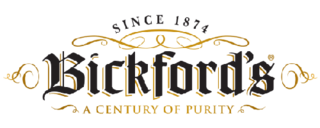
Bickford's Australia Pty. Ltd. is an Australian beverage manufacturer based in South Australia. The brand produces traditional cordials, soft drinks, and iced coffee mix originally manufactured by A. M. Bickford & Sons, a pharmaceutical chemist founded by Anne Margaret Bickford in 1864. In 1999, the brandname was acquired by the Kotses family and later renamed Bickford's Australia, after which the brand saw a revival in popularity with the introduction of new flavours and products. In 2006, Bickford's lime juice cordial was recognised by the National Trust of South Australia as a Heritage Icon.















